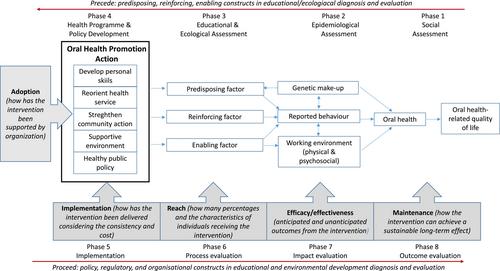Workplaces have considerable potential for enhancing personal resources and providing a supportive working environment for staff health, including oral health and well-being. To date, assessments of workplace oral health promotion (WOHP) activities have observed benefits ranging from self-reported oral health to clinical parameters. However, previous WOHP actions were not based on a theoretical framework and did not consider the working environment as part of the planning and evaluation process.
This article used evidence-based health promotion theoretical frameworks, and associated facilitators and barriers, in constructing an integrated and theoretically robust approach to planning and evaluating oral health promotion activities in the workplace.
The PRECEDE-PROCEED Model for planning and evaluation, the reach effectiveness adoption implementation maintenance, and the Salutogenic Model of Health were chosen to complement each other in the planning and evaluation process, based on their different features and the applicability of those features to the workplace setting. Because of the limited literature in this area, the current article also used evidence from oral health promotion in other settings (including schools and the community) and general health promotion in the workplace to construct a theoretical framework for planning and evaluating WOHP activities.
The theoretical framework developed could assist in planning or improving existing workplace health promotion programs that focus on or incorporate oral health elements.
Future research on applying and adapting the proposed framework is required.



